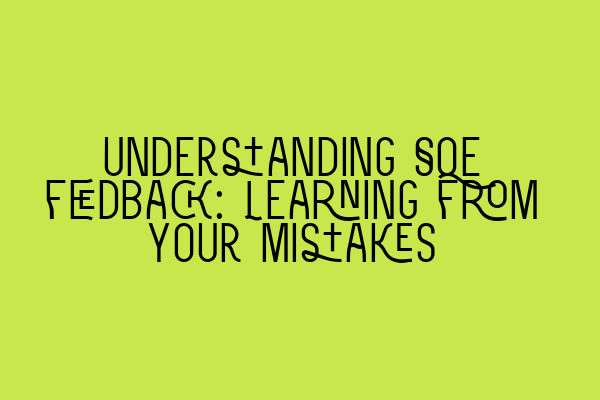Understanding SQE Feedback: Learning from Your Mistakes
As you embark on your journey to become a qualified solicitor, one of the most important aspects of your training is receiving and learning from feedback. The Solicitors Qualifying Exam (SQE) is designed to test your knowledge, skills, and aptitude for the legal profession. Feedback is an invaluable tool that can help you identify your strengths and weaknesses, and ultimately improve your performance. In this blog post, we will explore the significance of SQE feedback and provide you with tips on how to effectively learn from your mistakes.
Why is SQE Feedback Important?
Feedback plays a crucial role in your development as a solicitor. It provides you with valuable insights into your performance, allowing you to identify areas where you excel and areas that require improvement. SQE feedback can help you gauge your proficiency in different legal topics and skills, enabling you to focus your efforts on areas that need more attention.
By understanding the feedback provided, you can make informed decisions about your study strategy and tailor it to your specific needs. It allows you to prioritize your learning, ensuring that you allocate sufficient time and effort to areas that are likely to arise in the exam.
Tips for Interpreting SQE Feedback
1. Read the feedback carefully: Take the time to thoroughly read through your SQE feedback. Pay close attention to any comments or suggestions provided by your tutors or examiners. Look for patterns in the feedback and identify common themes or areas where you consistently struggle.
2. Use feedback to create an action plan: Once you have identified the areas that require improvement, create a structured action plan. Break down your plan into specific tasks and set realistic goals. For example, if you struggle with understanding residential leases, you could start by reading articles such as “Legal Considerations in Residential Leases: Essential Insights for Solicitors.” This will help you gain a deeper understanding of the topic and address any knowledge gaps.
3. Seek additional resources: In addition to the recommended articles provided, explore other relevant resources that can help you strengthen your knowledge. For example, if you need a better understanding of the differences between freehold and leasehold properties, you can refer to the article “Freehold vs Leasehold: Understanding the Differences.” By diversifying your learning materials, you can gain multiple perspectives and reinforce your understanding of the subject matter.
4. Practice and review sample questions: To improve your exam performance, it is crucial to practice regularly. Seek out sample questions or past papers that align with the topics highlighted in your feedback. This will help you apply your knowledge in a practical context and familiarize yourself with the type of questions you may encounter in the actual exam. A helpful resource for practicing property law questions is the article “MCQ Strategies for SQE Property Practice: Tips for Exam Success.”
5. Reflect on your progress: Regularly assess your progress by reviewing your performance and comparing it to previous feedback. Celebrate your achievements and acknowledge areas where you have made improvements. Reflecting on your progress will boost your confidence and motivate you to continue striving for excellence.
Remember, learning from your mistakes is an essential part of the learning process. Rather than viewing feedback as a setback, embrace it as an opportunity for growth and development. By utilizing the insights provided through SQE feedback, you can refine your skills, expand your knowledge, and approach your exams with confidence.
In conclusion, SQE feedback is an invaluable resource that can help you improve your performance and achieve success in your journey to becoming a qualified solicitor. By carefully interpreting and using feedback to create an action plan, seeking out additional resources, practicing regularly, and reflecting on your progress, you can make the most of this valuable tool. Remember, learning is a continuous process, and by incorporating feedback into your study routine, you will be better equipped to overcome challenges and excel in your future exams.

Leave a Reply